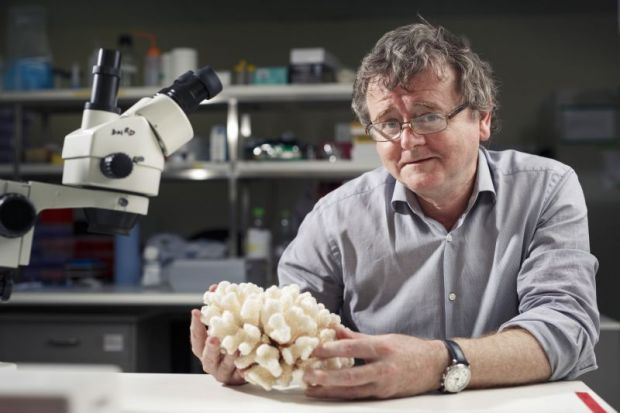Terry Hughes is a professor of marine biology based at the Centre of Excellence for Coral Reef Studies in Townsville, Australia. In November, Professor Hughes was awarded this year’s John Maddox Prize, which honours those who stand up for science in the face of hostility. It recognised the work he has done on how climate change affects coral reefs despite facing political smears, aggression from the Australian tourist industry and attempts to discredit his research.
Where and when were you born?
Dublin, 1956.
How has this shaped you?
I left Ireland when I was 22, but I still value my Irish roots and return to visit every other year or so. My primary degree, in zoology from Trinity College Dublin, was a great foundation for the next steps in my career in the US and Australia.
What kind of undergraduate were you?
I was pretty serious. On the other hand, I was asked once by a tourist if I knew the locations of the 10 best pubs in Dublin. I was able to direct him to all of them.
What’s your most memorable moment at university?
The best part of being an undergrad was the marine biology field trips – often to remote, beautiful places on the Irish coast – and having the opportunity to spend a summer at Discovery Bay Marine Lab in Jamaica. It was my first experience of a coral reef. I was smitten at first sight.
How did it feel to win the John Maddox Prize?
Marvellous. I’m very honoured. While many people support scientists speaking out on issues of public concern, some of us regularly face hostility, especially in the climate change space, where vested interests continue to support fossil fuels despite the threat that they pose to global sustainability. The prize is empowering, [and] I hope it encourages other scientists to be more vocal in public debates.
Why is it important to you to get your findings to the public?
People need to know that climate change is real, not something that might happen in the future, because it is affecting all of us already. My colleagues and I recently measured the enormous damage of unprecedented climate extremes on the Great Barrier Reef. Our findings influenced the political debate in Australia and elsewhere, reinforcing the need for urgent action on reducing greenhouse gas emissions.
How do you deal with attempts to quash or discredit your research?
I just ignore them. You delete abusive emails, block aggressive responders on social media and try to fight ignorance with facts.
What gives you strength in the face of adversity?
The support of my colleagues and the urgency of needing to speak out. Now is not the time to be silent on the grave threat of climate change to vulnerable ecosystems and the people who depend on them. If my grandchildren ask me, “did I speak out when I knew the Great Barrier Reef was crashing”, I’ll be able to look them in the eye and say, “yes”.
What advice would you give other researchers who face similar smears?
It’s especially hard on younger researchers to face up to powerful vested interests like Australia’s coal industry. I would like to see a more forceful dialogue from our science bodies and societies, who have the authority of their large memberships. Speaking up isn’t just the responsibility of individuals.
Have you had a defining moment in your research career?
Leading a successful bid for an Australian Research Council Centre of Excellence in 2006, and again in 2014 [the centre failed to secure funding this year]. It allowed me to build the largest coral reef research centre in the world. More recently, the tragic global-scale bleaching of corals in 2015 to 2017. I will never forget [seeing from a helicopter] hundreds of reefs at the height of the bleaching in 2016, when one in three corals died along the length of the Great Barrier Reef.
What are the best and worst things about your job?
The best things are the great people I work with, the sustained support we have received from the ARC, and international interest in our research on coral reefs. The worst thing is the contested politics of climate change in Australia and the [resulting] lack of meaningful action to curb the decline of the Great Barrier Reef.
If you were science minister for a day, what policy would you introduce?
The first step would be to appoint an Australian science minister: we don’t actually have one. I would boost funding for early career researchers and reduce the level of political interference in research funding.
If you weren’t working in higher education, what do you think you’d be doing?
I enjoy research too much to leave the sector. My job is challenging and rewarding, and I hope I have helped to inform people about the need to tackle climate change. It would be harder to be outspoken in Australia outside the university sector, where government agencies have seen severe cuts to funding for climate research.
What saddens you?
The apathy and lack of response to the downward trajectory of the world’s coral reefs. The Great Barrier Reef has now bleached severely four times because of global warming: in 1998, 2002, 2016 and 2017. The last two events killed close to one in every two corals. Yet our state and commonwealth governments still promote the development of fossil fuels, including a giant new coal mine [the Carmichael coal mine]. The reef has become a super-highway for the export of coal and fracked gas. It’s a national and international disgrace.
What brings you comfort?
Too much wine.
What one thing would improve your working week?
I’d like to be cloned, to share the workload.
Tell us about someone you’ve always admired.
My amazing wife. We met in a second-year biochemistry lab in Dublin; she’s been my rock and best friend for nearly 40 years.
What would you like to be remembered for?
Being a good husband and parent, for the science I’ve done, for supporting the next generation of researchers, and for trying to communicate our climate change research to anyone who’ll listen.
anna.mckie@timeshighereducation.com
Appointments
Jean-Noël Ezingeard has been named the next vice-chancellor of the University of Roehampton. Professor Ezingeard, currently deputy vice-chancellor of Manchester Metropolitan University, will succeed Paul O’Prey at the London institution in May. A French engineering science graduate, Professor Ezingeard has previously held leadership positions at Brunel University London, Kingston University and Henley Business School. Sir David Bell, chair of Roehampton’s council, said that Professor Ezingeard’s “commitment to inclusion and widening participation, his passion regarding the value…of academic research, and his vision for developing further our partnerships with industry, all make him the ideal candidate to take the university forward into the next chapter of our story”.
The new chief executive of the Scottish Funding Council will be Karen Watt, currently director of external affairs in the Scottish government. John Kemp, the council’s director of access, skills and outcome agreements, had been interim chief executive since the retirement of Laurence Howell in August 2016. Ms Watt, who will join the council in January, was the first chief executive of the Scottish Housing Regulator and has also served as principal private secretary to Scotland’s first minister. She said that she was “delighted to have the opportunity to be part of the mission and ambition to shape the future of learning, skills, research and innovation in Scotland”.
Irene McAra-McWilliam has been named director of the Glasgow School of Art on a one-year contract. She had been serving as interim director alongside fellow deputy director Ken Neil since Tom Inns resigned last month. A full candidate search will be conducted for the permanent appointment.
John Fisher has been appointed the Royal Welsh College of Music and Drama’s first artistic director of the David Seligman Opera School.
Nia White has become a professor of innovation in research at Abertay University.
Register to continue
Why register?
- Registration is free and only takes a moment
- Once registered, you can read 3 articles a month
- Sign up for our newsletter
Subscribe
Or subscribe for unlimited access to:
- Unlimited access to news, views, insights & reviews
- Digital editions
- Digital access to THE’s university and college rankings analysis
Already registered or a current subscriber? Login








